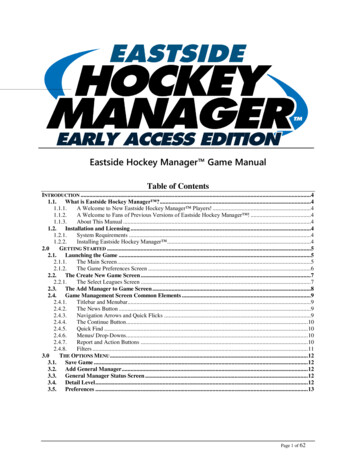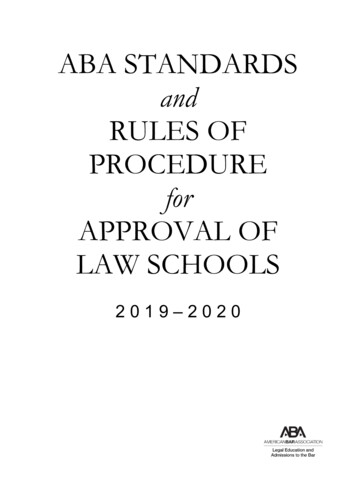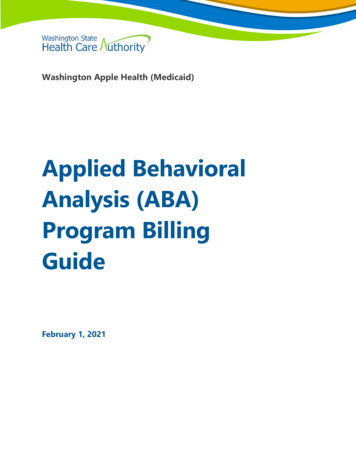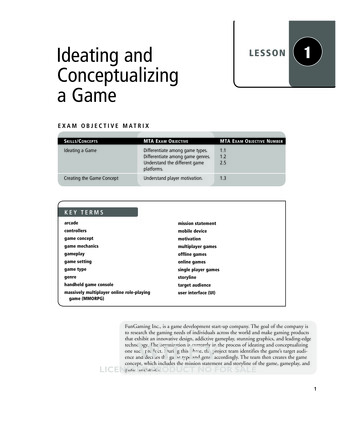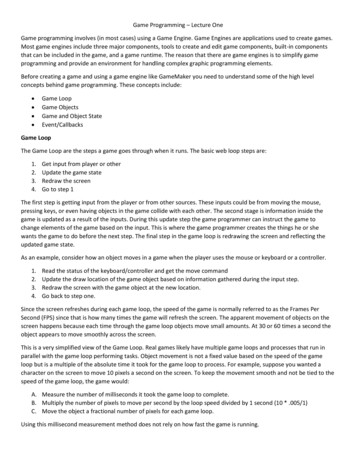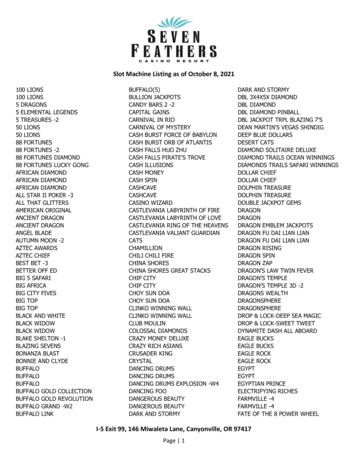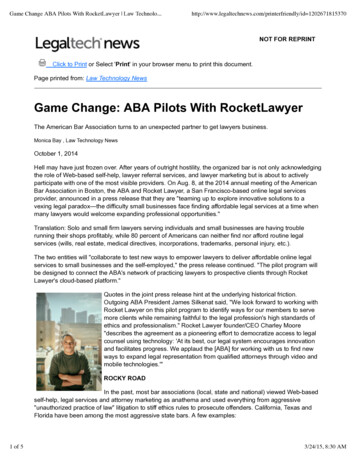
Transcription
Game Change ABA Pilots With RocketLawyer Law dly/id 1202671815370NOT FOR REPRINTClick to Print or Select 'Print' in your browser menu to print this document.Page printed from: Law Technology NewsGame Change: ABA Pilots With RocketLawyerThe American Bar Association turns to an unexpected partner to get lawyers business.Monica Bay , Law Technology NewsOctober 1, 2014Hell may have just frozen over. After years of outright hostility, the organized bar is not only acknowledgingthe role of Web-based self-help, lawyer referral services, and lawyer marketing but is about to activelyparticipate with one of the most visible providers. On Aug. 8, at the 2014 annual meeting of the AmericanBar Association in Boston, the ABA and Rocket Lawyer, a San Francisco-based online legal servicesprovider, announced in a press release that they are "teaming up to explore innovative solutions to avexing legal paradox—the difficulty small businesses face finding affordable legal services at a time whenmany lawyers would welcome expanding professional opportunities."Translation: Solo and small firm lawyers serving individuals and small businesses are having troublerunning their shops profitably, while 80 percent of Americans can neither find nor afford routine legalservices (wills, real estate, medical directives, incorporations, trademarks, personal injury, etc.).The two entities will "collaborate to test new ways to empower lawyers to deliver affordable online legalservices to small businesses and the self-employed," the press release continued. "The pilot program willbe designed to connect the ABA's network of practicing lawyers to prospective clients through RocketLawyer's cloud-based platform."Quotes in the joint press release hint at the underlying historical friction.Outgoing ABA President James Silkenat said, "We look forward to working withRocket Lawyer on this pilot program to identify ways for our members to servemore clients while remaining faithful to the legal profession's high standards ofethics and professionalism." Rocket Lawyer founder/CEO Charley Moore"describes the agreement as a pioneering effort to democratize access to legalcounsel using technology: 'At its best, our legal system encourages innovationand facilitates progress. We applaud the [ABA] for working with us to find newways to expand legal representation from qualified attorneys through video andmobile technologies.'"ROCKY ROADIn the past, most bar associations (local, state and national) viewed Web-basedself-help, legal services and attorney marketing as anathema and used everything from aggressive"unauthorized practice of law" litigation to stiff ethics rules to prosecute offenders. California, Texas andFlorida have been among the most aggressive state bars. A few examples:1 of 53/24/15, 8:30 AM
Game Change ABA Pilots With RocketLawyer Law dly/id 1202671815370 California (and most states) will not accredit continuing legal education programs about lawyermarketing. Searcy Denney Scarola Barnhart & Shipley, a personal injury firm, sued the Florida Bar in federal court,asserting that the bar's advertising rules violated the First Amendment and were unconstitutionally vague.The vagueness claim was dismissed with prejudice in July but the litigation continues, said Adam Losey,an associate at Foley & Lardner who resides in Orlando. Prior to the litigation, a number of the advertisingrules were deleted and replaced. Florida's new rules require that certain statements in advertisementsmust be "objectively verifiable," Losey said. Famously, the State Bar of Texas and the Supreme Court of Texas went so far as to try to ban self-helplegal books and software from Nolo Press and others, citing UPL statutes. "After a two-year fight, theTexas legislature finally passed a law in 1998 to make it clear that selling law books and software was not'practicing law without a license,'" recalls Nolo on its website.More recently, at Stanford Law School's 2014 "CodeX" conference, Edward Hartman , co-founder ofLegalZoom—which offers state-specific business and personal legal forms and documents (some withattorney help)—reported that the South Carolina Supreme Court "finally said that LegalZoom is notunauthorized practice of law."Bar advocates have always insisted that their motives were pure and designed to protect clients. But theorganized bar has never been able to successfully address the embarassment that 80 percent of workingand middle-class Americans can't find affordable legal services for routine matters, according to numeroussurveys. The poor theoretically have access to legal services; the rich have the Am Law 200 firms (andothers) to serve their needs, but small firm lawyers and their potential clients can't seem to find the sweetspot of affordability for clients and profitability for the lawyers.After decades of chest-thumping by bar groups pledging to address the problem, without success,technology may be the ultimate answer. "We are at the early stages of reviewing how the ABA might useRocket Lawyer's online platform to develop a pilot program to expand legal services ethically andprofessionally," current ABA president William Hubbard told Law Technology News in mid-September. "Wewant to look at whether there are ways to link up small businesses that have difficulty locating affordablelegal services with lawyers who are interested in expanded professional opportunities," said Hubbard, apartner at Nelson Mullins Riley & Scarborough. Beyond that, the ABA and Rocket Lawyer remain mumabout the details of the pilot project. In August, Silkenat told The Wall Street Journal that the basic planwould be to have a few hundred ABA members in a few states use the site. "We'll monitor the kind ofservices they provide, how clients repond to them, make sure it really is the underserved communities theyare responding to," he said. Rocket Lawyer will not make a profit off the pilot, he told the WSJ. "But thecompany will benefit from the ABA's imprimatur," said Silkenat. "From Rocket Lawyer's point of view, Ithink they see us as a validating part of the process. We have access to tremendously qualified lawyersthroughout the country."ROCKET LAWYERRocket Lawyer was founded in 2008 with the goal of making law affordable and simple for everyone,explained Moore. "I grew up in a family business and saw firsthand what a difference lawyers can make,for better or worse. So, by the age of 12 or so, I'd decided that I wanted to become an attorney," he said."By the time I got to law school in Berkeley, in the mid-'90s, the early stages of commercializing theInternet had started, and I geeked out on law and technology," said Moore.The early days were challenging. "Turns out that we started the company just as the economy crashed,"recalled Moore. "So the company was self-funded for quite a while." The early struggle tested and2 of 53/24/15, 8:30 AM
Game Change ABA Pilots With RocketLawyer Law dly/id 1202671815370reinforced our commitment, he said. "In the end, consumers pick the winners and losers in themarketplace. It's clear that they react positively to low cost and high quality. The challenge is deliveringboth, at the same time. That's our mission and our passion."Today, Rocket Lawyer has more than 10 million individual and business members, Moore said. It has 200full-time employees and additional offices in Utah, Mexico and the U.K.Rocket Lawyer has financial banking and technical support from Google Ventures, August Capital, MorganStanley Venture Partners, Investor AB and Industry Ventures. Its website lists 24 partners, including Aon,Experian Information Solutions Inc., Kroll Inc. and Transamerica Corp.While much is known about the consumer need, less obvious is the need for lawyers to get clients, saidMoore. "Only 55 percent of law school graduates since 2011 hold a full-time, long-term position requiring alaw degree. In 2013, a quarter of law school graduates were unemployed or underemployed."HOW IT WORKSRocket Lawyer's operation is similar to its online competitors' work. It has lawyers in all 50 states andtargets individuals and small business owners. After a free one-week trial, customers choose between amonthly flat fee of 40 or two discounted annual plans: 400 for the Complete Legal Plan; 500 for theAccelerate Legal Plan for incorporations, which includes Registered Agent service.Members can "Ask a Lawyer" questions via email or phone. If a memberchooses to hire the lawyer for further work, Rocket Lawyer representatives helpset up the appointment and negotiate a discounted rate. Alternatively, users canpick a lawyer directly through the site's directory, in which case the user contactsthe lawyer and negotiates the fees.Members can download legal documents and forms, with step-by-stepinstructions. Management tools help users share and edit forms; an e-signatureservice is included. Lawyers can review documents to be sure they are correct.Lisa Honey, director of document services, oversees quality control and isresponsible for gathering documents users want. Her legal researchers work closely with Rocket Lawyer's"On Call" attorneys to keep documents up to date, said Honey, who is licensed in California, Texas andArkansas.For lawyers, membership is free if they join the On Call network, and they get full access to documents,forms, e-signatures and other functions. Currently, 10,000 lawyers maintain a profile and/or participate inthe On Call network, said Moore. On Call attorneys are assigned a dedicated representative who sets upappointments for the lawyer and negotiates the rate. If attorneys do not participate in the network, they paythe same rate as non-lawyers for the plans and may list themselves on the website's Attorney Directory.CONCIERGEJay Mandal , senior director and head of the legal advice business at Rocket Lawyer, spoke at ALM'sLegalTech West Coast in May. The panel "Competitors or Frenemies" addressed the premise that lawyersserving individuals and small businesses would be smart to act more like a "concierge" than a traditionallawyer and counsel clients on when they can use self-help."Lawyers are under tremendous pressure to demonstrate value commensurate to the billable rates thatthey charge clients," said Mandal, who joined Rocket Lawyer when itacquired his company, Law Pivot (hewas CEO and co-founder).3 of 53/24/15, 8:30 AM
Game Change ABA Pilots With RocketLawyer Law dly/id 1202671815370For work that involves standard forms, "it makes sense for lawyers to guide clients through affordableonline legal services tools," said Mandal. "That way, lawyers can be more efficient, and charge for theirspecialized legal advice, which is valuable to their clients."In 10 years, Mandal predicts, "the expertise of lawyers will continue to be valued by clients, but themedium of communication and the lawyers' reliance on technology will change." Mobile and tablettechnologies are "omnipresent" today, and "will become increasingly important in how lawyers and clientsinteract," he said.Lawyer David Whelan, manager, legal information at the Law Society of Upper Canada in Toronto, wasalso on the panel. He argued that the ultimate reality is a mix: "Technology. Price. Income. Geographiclocation. Current legal issue. Previous legal issues. All of these will factor into whether clients will useemerging automation tools on commodity work or select a legal professional."ALL BOATS WILL RISEWill competitors of Rocket Lawyer benefit from the American Bar Associationpartnership? "We're always happy to see broader technology adoption bylawyers and bar associations. So the announcement of this deal is exciting fromthat standpoint alone," said Mark Britton, founder, CEO and president of Avvo."I have to assume the ABA is trying to help its members get more business,which is a good thing, said Britton, who founded the Seattle-based company in2007. "However it raises the question of how the ABA's members plug intoRocket Lawyer's largely do-it-yourself forms business. It's a curious combination, and I look forward tolearning more."Britton, who previously worked at Expedia Inc., Preston Gates & Ellis and the U.S. Securities & ExchangeCommission, takes the philosophy that "if we help everyday people make better-informed legal decisions,then all boats will rise. People will feel more comfortable engaging lawyers, and thus lawyers will get morebusiness. It's really that simple, but too many players are still making things complicated, by sellingcustomers to the highest bidder," he said. "That's a Yellow Pages mentality that is fortunately dying out inthe modern Internet era."Avvo claims to have detailed profiles for 95 percent of practicing U.S. lawyers. Upgrade options forlawyers include Avvo Pro (expanded profiles), advertising, websites, and marketing software, among otherofferings. Customer services range from free advice to flat-fee 29 legal advice and a new "instant phonecall" (15 minutes for 29.) Users can "find a lawyer" by practice area, state or city, download documents,and more."I've been cheering on fixed fees for years. It feels like a no-brainer to me, but still many lawyersdisagree," said Britton. His focus is not on the entire attorney-client relationship, but entry-level—"unbundled items to start the relationship. Any attorney who needs more business can (and should) bedoing this, it just takes a little more expansive thinking."In the legal directory arena, Britton sees FindLaw and Lawyers.com as competitors. But with theLawyers.com, Martindale and Internet Brands partnership, "I'm not sure what these businesses will looklike going forward. If they are simply lead-generation websites—buying traffic at one rate to sell lawyers ata higher rate—then they won't really be our competitors going forward."Why has it been so difficult for small businesses to find lawyers, and lawyers to find the right clients?4 of 53/24/15, 8:30 AM
Game Change ABA Pilots With RocketLawyer Law dly/id 1202671815370"Lawyers are horrible at marketing," he said. Few lawyers understand even the basics of marketing andbusiness development, he asserts. "If you ask most lawyers how they identify, segment and targetpotential clients, their heads will explode," said Britton."The biggest roadblock is mental. It starts in law school and persists with continuing legal education.Lawyers are taught to be legal technicians—that's it—even though most of them will be operating smallbusinesses within five years of graduation," he said."We need to recognize that we are businesspeople. With that self-awareness, we can start educatinglawyers earlier and more often regarding business best practices, giving them a better shot at thriving inthe legal professions," said Britton."Technology is making many of these best practices automated and more accessible to lawyers. Whetherit is legal research, client communication, marketing, business development, there are myriad new toolsthat are making lawyers more successful than they ever could have imagined."Monica Bay is the editor-in-chief of LTN and a member of the California bar. @lawtechnews@LTNMonicaBay.:::RELATED STORY:::"Unexpected Bedfellows: Nolo and Martindale," by Monica Bay.Monica Bay is the editor-in-chief of LTN and a member of the California bar. @lawtechnews@LTNMonicaBayCopyright 2015. ALM Media Properties, LLC. All rights reserved.5 of 53/24/15, 8:30 AM
"describes the agreement as a pioneering effort to democratize access to legal counsel using technology: 'At its best, our legal system encourages innovation and facilitates progress. We applaud the [ABA] for working with us to find new ways to expand legal representation from qualified attorneys through video and mobile technologies.'" ROCKY ROAD

